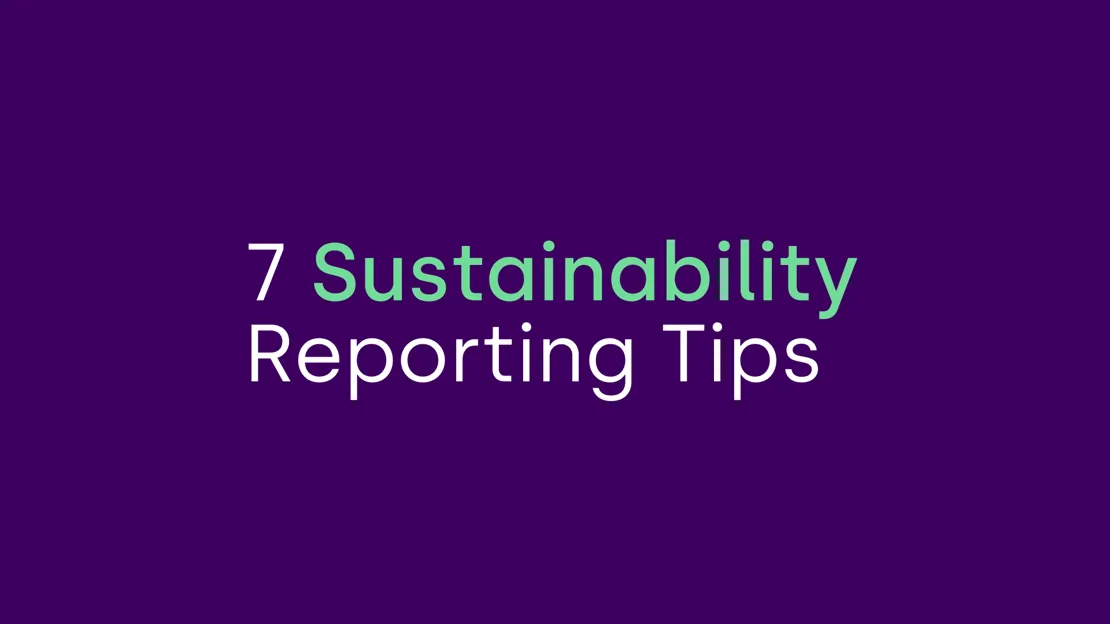Reporting and communicating activities: simple actions to make your sustainability reporting more effective
With time, effort and money going into making your business more sustainable, there are a number of reasons you’ll want to document the activities that you’re doing.
Sustainability reporting focuses on communicating the progress of your specific ESG (environmental, social and governance) goals.
Clear and concise reports with up to date facts and figures will allow you and those involved with your business to track your progress and successes.

Why is sustainability reporting important?
Before we focus on the simple ways you can make your sustainability reporting more effective, let’s check in with some of the key reasons why sustainability reporting is important to your business:
- It offers a tangible way for customers and investors to see your commitment to tackling social, environmental and ecological issues. This can in turn increase confidence and trust with everyone, from your customers or stakeholders to your local community.
- It helps you to demonstrate your credibility and may be helpful in attaining sustainability certifications and accreditations.
- It allows you to identify which measures are successful and which need improvement. These reports can help your business’s decision-making processes and influence your planning.

How to make your sustainability reporting more effective
 Recognise the importance of reporting
Recognise the importance of reporting
Many companies will produce a sustainability report yet few of these will truly stand out and often seem half-hearted or as though they have simply been done to comply.
Try to view your sustainability report as a way to showcase the extensive time, effort and money your business has invested in progressing towards a more sustainable future.
Having a note from your CEO, founder or a senior member of the company to begin the report will show the strength of the business’s commitment at every level. Show how sustainability is being integrated throughout your business from your business strategy to specific events that you can evidence.
Set the scene
Make sure that your report is accessible to as many different people as possible by taking the time to put it in context.
Give a brief overview of your business and the market that you’re operating in whilst introducing the topic of sustainability within the first paragraph.
Write about how your business has reached this point in its sustainability journey and the efforts that it has taken to get here.
You may want to describe the general approach towards sustainability amongst employees and how they have benefited from working within a sustainable environment.

Use online channels and social media for reporting
Reporting and communicating activities doesn’t have to be confined to a single document. Social media can be incredibly powerful as a way of reporting and communicating the efforts that your business is making on a daily basis to become more sustainable.
Try to use your social media accounts to cover specific events such as community workshops or local fundraisers that you are involved with. You may want to consider a mini series of interviews with people you have helped in the local community or customers who have experienced first hand your sustainable approach.
As well as referencing this type of event or interaction in your sustainability reporting, communicating them in real-time will provide valuable content and demonstrate your credibility.
You should also ensure that your website is regularly updated with information about what you are doing in your efforts as a sustainable business.
 Be transparent
Be transparent
Sustainability reporting should be accurate and honest. Make sure that you include the positive aspects of your business’s attempts to be as sustainable as possible, alongside the shortcomings and areas where you recognise the need to improve.
A sustainable business strategy can take time to implement so it’s important to acknowledge the progress that is still to be made. Sustainability reporting is most effective when it is honest and current.
Make sure you paint a realistic picture of what’s really going on with your business as you learn and adapt.
 Provide evidence
Provide evidence
Ensure that you present facts and figures alongside specific examples of your efforts and activities in your sustainability reporting.
As well as referencing events you have organised and attended, or schemes you have implemented, make sure that you show the tangible ways in which your sustainability strategy has impacted your business’s profits.
Anecdotal evidence, such as quotes from those in the community you have worked with or employees who have signed up for a cycle to work scheme, can also be an excellent way to make your sustainability reporting effective and engaging.
 Look ahead
Look ahead
Whilst the majority of your sustainability report will focus on your efforts so far and the progress that you have made, you’ll want to conclude the report by looking ahead to challenges or goals that you are seeking to overcome and achieve.
Try to set out key areas where you are focussing your efforts and give evidence of tangible measures that your business is working towards.
Setting deadlines for when you are aiming to attain these goals will help to show evidence of accountability.
With sustainability so heavily focussed on looking to the future, any sustainability reporting should reference the ways in which your business is changing its ways to ensure its longevity for years to come.


